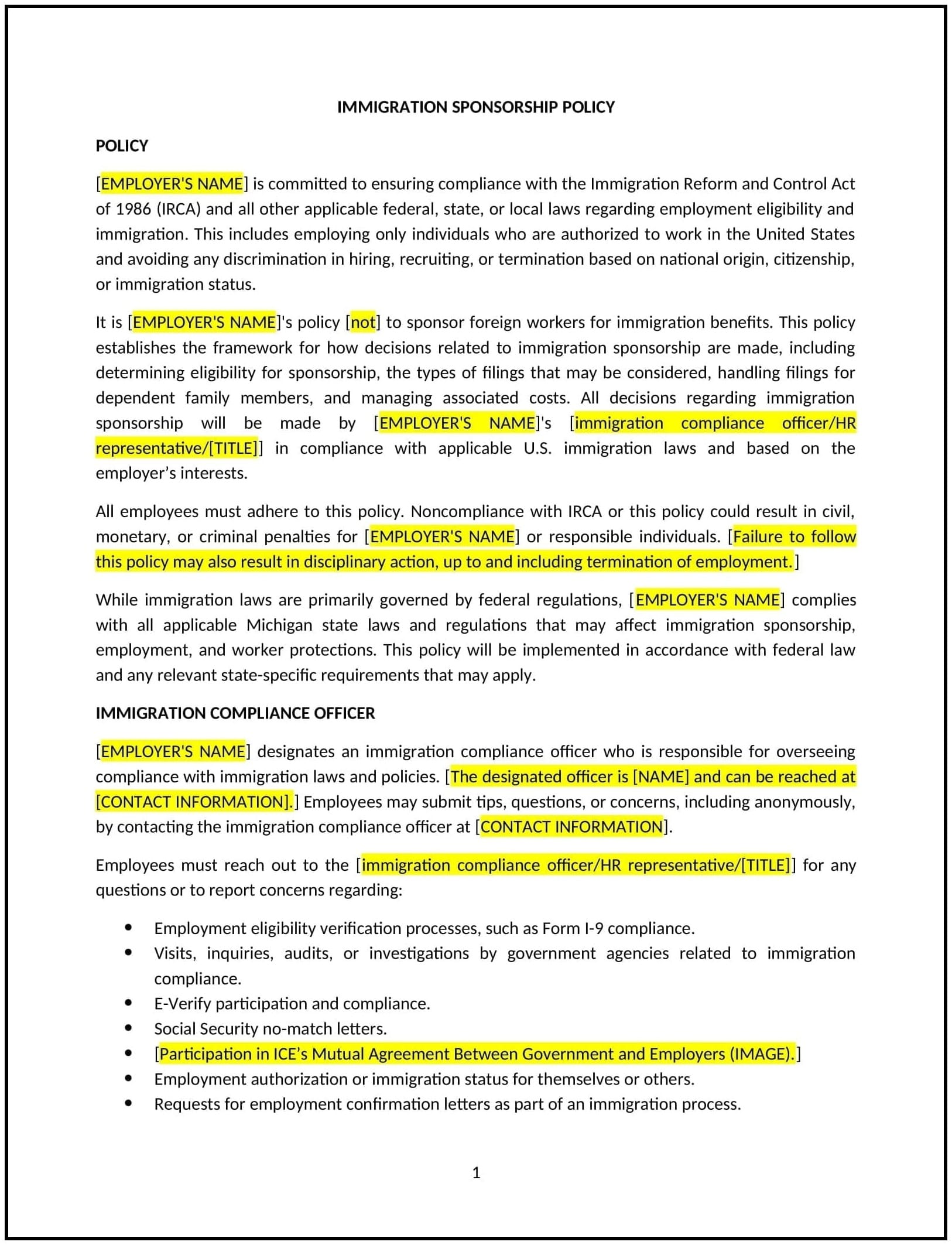Immigration sponsorship policy (Michigan): Free template
Got contracts to review? While you're here for policies, let Cobrief make contract review effortless—start your free review now.

Customize this template for free
Immigration sponsorship policy (Michigan)
An immigration sponsorship policy provides Michigan businesses with guidelines on sponsoring foreign workers for immigration benefits, such as work visas, permanent residency (green cards), or other employment-related immigration procedures.
By adopting this policy, businesses can attract skilled talent from a global pool, ensure legal compliance, and provide support to foreign workers navigating the immigration process.
How to use this immigration sponsorship policy (Michigan)
- Define eligibility criteria: Specify which employees are eligible for immigration sponsorship, such as those who are critical to the company’s operations or possess specialized skills. Clarify the criteria for sponsorship, including job position, qualifications, and the type of visa or immigration benefit sought.
- Outline the sponsorship process: Provide clear steps for how the sponsorship process works, from identifying eligible candidates to filing petitions and handling any required paperwork. Include the timeline and roles of HR, legal counsel, and the employee in the process.
- Detail financial responsibilities: Clarify who is responsible for the costs associated with sponsorship, including legal fees, filing fees, and any other associated costs. The policy should specify whether the company will cover these expenses or if the employee will be required to contribute.
- Address work authorization: Define the types of work authorization the business will sponsor, such as H-1B, O-1, or other visas, and clarify any restrictions on job duties or geographical location.
- Ensure legal compliance: Ensure that the policy complies with all federal immigration laws, including the Immigration and Nationality Act (INA), and any Michigan state laws related to employment eligibility and worker sponsorship.
- Provide documentation requirements: Outline the documentation required for sponsorship, such as proof of the employee’s qualifications, educational background, and any necessary visa or immigration forms.
- Establish support during the process: Offer support for employees throughout the immigration process, such as providing legal resources, assisting with paperwork, and addressing any concerns regarding their status.
- Review policy regularly: Periodically review the policy to ensure it aligns with changes in federal immigration laws, Michigan state laws, and business needs.
Benefits of using this immigration sponsorship policy (Michigan)
This policy provides several key benefits for Michigan businesses:
- Expands talent pool: By sponsoring foreign workers, businesses can attract a broader range of highly skilled talent that may not be available in the local labor market.
- Complies with immigration laws: The policy ensures that the business complies with federal and state immigration laws, reducing the risk of legal issues related to employee work authorization.
- Supports business growth: Sponsoring foreign workers can help businesses meet critical staffing needs and expand their operations, especially in industries facing talent shortages.
- Enhances diversity and inclusion: By sponsoring workers from diverse backgrounds, businesses promote diversity within their workforce, which can lead to increased creativity, innovation, and problem-solving.
- Improves employee retention: Offering immigration sponsorship can increase employee loyalty, as foreign workers are more likely to stay with an employer who helps them navigate the immigration process.
Tips for using this immigration sponsorship policy (Michigan)
- Communicate the policy clearly: Ensure that employees are aware of the immigration sponsorship policy by including it in the employee handbook, during onboarding, and through regular internal communications.
- Train HR and legal teams: Provide training for HR and legal staff to ensure they understand the complexities of immigration law and the process of sponsoring employees for immigration benefits.
- Be transparent with employees: Clearly communicate the sponsorship process to employees, including the timeline, required documentation, and any costs or responsibilities associated with the sponsorship.
- Ensure fairness: Apply the policy consistently across all eligible employees and avoid any discrimination in the sponsorship process, based on race, gender, or nationality.
- Review periodically: Regularly review the policy to ensure it remains compliant with changes in Michigan laws, federal immigration laws, and the business’s staffing needs.